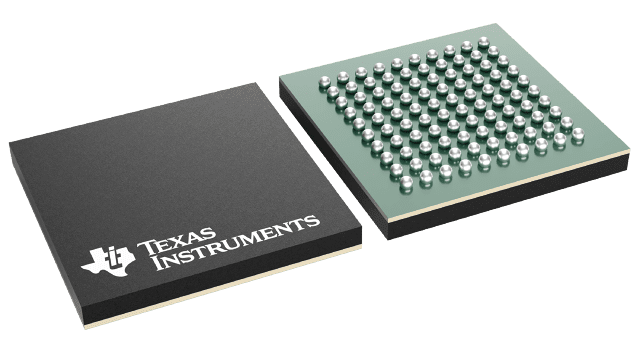Gehäuseinformationen
| Gehäuse | Pins NFBGA (GBA) | 100 |
| Betriebstemperaturbereich (°C) -40 to 125 |
| Gehäusemenge | Träger 184 | JEDEC TRAY (5+1) |
Merkmale von TMS320F2808
- High-performance static CMOS technology
- 100 MHz (10-ns cycle time)
- 60 MHz (16.67-ns cycle time)
- Low-power (1.8-V core, 3.3-V I/O) design
- JTAG boundary scan support
- IEEE Standard 1149.1-1990 Standard Test Access Port and Boundary Scan Architecture
- High-performance 32-bit CPU (TMS320C28x)
- 16 × 16 and 32 × 32 MAC operations
- 16 × 16 dual MAC
- Harvard bus architecture
- Atomic operations
- Fast interrupt response and processing
- Unified memory programming model
- Code-efficient (in C/C++ and Assembly)
- On-chip memory
- F2809: 128K × 16 flash, 18K × 16 SARAM F2808: 64K × 16 flash, 18K × 16 SARAM F2806: 32K × 16 flash, 10K × 16 SARAM F2802: 32K × 16 flash, 6K × 16 SARAM F2801: 16K × 16 flash, 6K × 16 SARAM F2801x: 16K × 16 flash, 6K × 16 SARAM
- 1K × 16 OTP ROM (flash devices only)
- C2802: 32K × 16 ROM, 6K × 16 SARAM C2801: 16K × 16 ROM, 6K × 16 SARAM
- Boot ROM (4K × 16)
- With software boot modes (via SCI, SPI, CAN, I2C, and parallel I/O)
- Standard math tables
- Clock and system control
- On-chip oscillator
- Watchdog timer module
- Any GPIO A pin can be connected to one of the three external core interrupts
- Peripheral Interrupt Expansion (PIE) block that supports all 43 peripheral interrupts
- Endianness: Little endian
- 128-bit security key/lock
- Protects flash/OTP/L0/L1 blocks
- Prevents firmware reverse-engineering
- Three 32-bit CPU timers
- Enhanced control peripherals
- Up to 16 PWM outputs
- Up to 6 HRPWM outputs with 150-ps MEP resolution
- Up to four capture inputs
- Up to two quadrature encoder interfaces
- Up to six 32-bit/six 16-bit timers
- Serial port peripherals
- Up to 4 SPI modules
- Up to 2 SCI (UART) modules
- Up to 2 CAN modules
- One Inter-Integrated-Circuit (I2C) bus
- 12-bit ADC, 16 channels
- 2 × 8 channel input multiplexer
- Two sample-and-hold
- Single/simultaneous conversions
- Fast conversion rate: 80 ns - 12.5 MSPS (F2809 only) 160 ns - 6.25 MSPS (280x) 267 ns - 3.75 MSPS (F2801x)
- Internal or external reference
- Up to 35 individually programmable, multiplexed GPIO pins with input filtering
- Advanced emulation features
- Analysis and breakpoint functions
- Real-time debug via hardware
- Development support includes
- ANSI C/C++ compiler/assembler/linker
- Code Composer Studio™ IDE
- SYS/BIOS
- Digital motor control and digital power software libraries
- Low-power modes and power savings
- IDLE, STANDBY, HALT modes supported
- Disable individual peripheral clocks
- Package options
- Thin quad flatpack (PZ)
- MicroStar BGA™ (GGM, ZGM)
- Temperature options
- A: –40°C to 85°C (PZ, GGM, ZGM)
- S: –40°C to 125°C (PZ, GGM, ZGM)
- Q: –40°C to 125°C (PZ) (AEC-Q100 qualification for automotive applications)
Beschreibung von TMS320F2808
The TMS320F2809, TMS320F2809-Q1, TMS320F2808, TMS320F2808-Q1 TMS320F2806, TMS320F2802, TMS320F2801-Q1, TMS320F28015-Q1, TMS320F28016-Q1, TMS320C2802-Q1, and TMS320C2801 devices, members of the TMS320C28x DSP generation, are highly integrated, high-performance solutions for demanding control applications.
Throughout this document, TMS320F2809, TMS320F2809-Q1 TMS320F2808, TMS320F2808-Q1 TMS320F2806, TMS320F2802-Q1, TMS320F2801-Q1, TMS320C2802, TMS320C2801, TMS320F28015-Q1, and TMS320F28016-Q1 are abbreviated as F2809, F2808, F2806, F2802-Q1, F2801-Q1, C2802, C2801, F28015-Q1, and F28016-Q1, respectively. TMS320F28015-Q1 and TMS320F28016-Q1 are abbreviated as F2801x. Device Comparison (100-MHz Devices) and Device Comparison (60-MHz Devices) provide a summary of features for each device.
